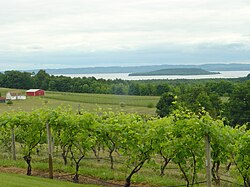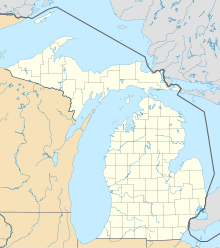The Old Mission Peninsula AVA is an American Viticultural Area located in Grand Traverse County, Michigan known for well-regarded Michigan wine. The Old Mission Peninsula extends northward from Traverse City into the Grand Traverse Bay of Lake Michigan, ending at Old Mission Point. The peninsula is 19 miles (31 km) long by 3 miles (5 km) wide at its widest point. The climate on the peninsula is moderated by the surrounding waters, helping to prevent frost during the growing season. Grape varietals suitable to cool climates, such as Riesling, Chardonnay, Gewürztraminer, Pinot gris, Pinot noir, Cabernet Franc, and Merlot do best in the Old Mission Peninsula AVA.[3]
| Wine region | |
 | |
| Type | American Viticultural Area |
|---|---|
| Year established | 1987[1] |
| Country | United States |
| Part of | Michigan |
| Climate region | Continental |
| Total area | 19,200 acres (7,770 ha)[2] |
| Grapes produced | Cabernet Franc, Cabernet Sauvignon, Chardonnay, Gamay noir, Gewurztraminer, Malbec, Merlot, Muscat Ottonel, Pinot blanc, Pinot gris, Pinot noir, Riesling[3] |
The peninsula has extensive cherry orchards and vineyards. There are ten wineries offering tasting rooms, each located within five miles of each other. Of Traverse City's two wine-growing peninsulas, Old Mission is smaller and more easily encompassed in a single day: just a little under 20 miles from end to end, and in places as little as three miles wide.[4] The hardiness zones are 5b and 6a.
History
editThe Old Mission Peninsula was settled in 1842 by a Presbyterian minister. During the Civil War period, the area saw an influx in population with many families today able to trace their ties to the area back to this period. Located along the 45th parallel north, and moderated by Lake Michigan and the deep Grand Traverse Bay, the region soon showed that it had macroclimate to produce a wide range of fruits and vegetables. Early agriculture in the area subsisted on apples, cherries and potatoes.[5] In 1870, George Parmalee, of the Michigan State Horticultural Society, encouraged farmers of Old Mission Peninsula to branch out to different plantings but it would be another 100 years before wine grape varieties really took hold in the area.[6]
In 1974 Edward O'Keefe Jr. of Chateau Grand Traverse began planting Vitis vinifera varieties including Chardonnay, Pinot noir and Riesling near Traverse City. The following year he expanded to 55-acre of grapevines, which was the first large-scale planting of Vitis vinifera..[7] (However, it was not the very first commercial planting of vinifera since Tabor Hill Winery of Berrien County, had planted a few experimental acres of vinifera grapevines in southwest Michigan in 1969.)[8]
In the 1980s, the Michigan wine industry saw growth throughout the state as several American Viticultural Areas, including Fennville, Lake Michigan Shore and the nearby Leelanau Peninsula, were approved. The Old Mission Peninsula received its AVA designation on June 8, 1987. The leading force behind AVA recognition came from Edward O'Keefe, whose Chateau Grand Traverse was the peninsula's only commercial winery at the time. Today the wine industry in the Old Mission Peninsula has expanded to include eight wineries and a thriving wine tourism industry.[7]
Grape varieties and wine styles
editCurrently the wineries of the Old Mission Peninsula are focused on the production of Vinifera wines with an average of 90,000 cases produced in the AVA on a yearly basis.[5] Among the grape varieties planted in the peninsula are Cabernet Franc, Cabernet Sauvignon, Chardonnay, Gamay noir, Gewurztraminer, Malbec, Merlot, Muscat Ottonel, Pinot blanc, Pinot gris, Pinot noir, Riesling.[3]
Wineries in Old Mission Peninsula AVA
editThere are eleven wineries in the Old Mission Peninsula AVA. The Old Mission Peninsula American Viticultural Area sits close to the 45th parallel, a longitude known for growing prestigious grapes. The wineries in the Old Mission Peninsula American Viticultural Area are 2 Lads Winery, Bonobo Winery, Black Star Farms, Bowers Harbor Vineyards, Brys Estate Vineyard & Winery, Chateau Chantal, Chateau Grand Traverse, Hawthorne Vineyards, Left Foot Charley (with vineyards in OMP, winery in Traverse City), Mari Vineyards, Peninsula Cellars, and Tabone Vineyards.[9]
References
edit- ^ "§9.114 Old Mission Peninsula" (Title 27: Alcohol, Tobacco and Firearms; Part 9 — American Viticultural Areas; Subpart C — Approved American Viticultural Areas). Code of Federal Regulations (e-CFR). Retrieved February 5, 2008.
- ^ "American Viticultural Areas by State". Wine Institute. 2008. Archived from the original on January 27, 2008.
- ^ a b c "Old Mission Peninsula (AVA): Appellation Profile". Appellation America. 2007. Archived from the original on March 25, 2016.
- ^ Norton, Michael (February 1, 2014). "Winter Wine-Touring on the Old Mission Peninsula". Traverse City Tourism Blog. Archived from the original on September 27, 2020.
- ^ a b Schreiber, Lorri (July 26, 2007). "Wine in the Old Mission Peninsula". Wine Enthusiast Magazine. Archived from the original on July 19, 2011. Retrieved April 30, 2012.
- ^ Kegerreis, Sharon; Hathaway, Lorri (February 1, 2010). "The History of Michigan Wine Industry: Pre 1900s" (PDF). Michigan Grape & Wine Industry Council. Archived from the original (2009-2010 Michigan Wine Industry Research, State of Michigan, Department of Agriculture) on July 14, 2011. Retrieved January 2, 2010.
- ^ a b Kegerreis, Sharon; Hathaway, Lorri. "The Early History of the Michigan Wine Industry" (PDF). Michigan Grape & Wine Industry Council. Archived from the original (2009-2010 Michigan Wine Industry Research, State of Michigan, Department of Agriculture) on January 19, 2011. Retrieved January 2, 2010.
- ^ Kegerreis, Sharon; Hathaway, Lorri. "The History of Michigan American Viticultural Areas (AVA)" (PDF). Michigan Grape & Wine Industry Council. Archived from the original (2009-2010 Michigan Wine Industry Research, State of Michigan, Department of Agriculture) on December 28, 2012. Retrieved January 2, 2010.
- ^ "Old Mission Peninsula Wine Trail".
